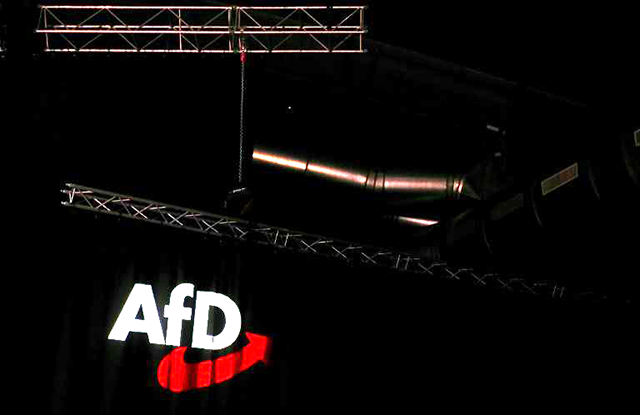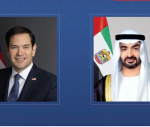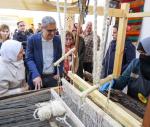You are here
Anger, fear, nostalgia-why German voters back far-right AfD
By AFP - Feb 16,2025 - Last updated at Feb 16,2025

People sing along as a demonstrator holds up a placard reading "If evolution had wanted the AfD, it would have run backwards", during a protest against the far right today in Berlin (AFP photo)
SCHWEDT, GERMANY - Two security guards stand watch outside a small castle hosting a campaign event for the far-right Alternative for Germany [AfD] in the ex-communist east, the party's heartland.
Around 30 voters have turned up, most of them elderly men, to learn about the health plans of the AfD, which mainly campaigns against immigration, multiculturalism and "woke" policies.
Beers are served with smoked sausages at the event in Schwedt near the Polish border, where the voters speak freely about their hopes and anxieties.
"The whole country is at rock bottom," said retiree Frank Iffert, 66, from Brandenburg state.
"We were better off with the Deutschmark," he said, backing the AfD promise to ditch the euro and bring back the currency synonymous with Germany's post-war prosperity.
On immigration, Iffert said people felt "threatened" by an influx of people, often fleeing war and misery, allowed into Germany under ex-chancellor Angela Merkel and since.
He voiced disdain for those who live on benefits and "don't want to work".
He also said that many migrants who came as so-called guest workers in the 1960s now "feel threatened themselves by migrants" and that some support the AfD.
A spate of bloody attacks blamed on asylum seekers has hardened the mood -- most recently a car ramming in Munich that killed two and wounded dozens, and saw an Afghan man arrested.
Mourning times gone by
With a week until the election, the AfD is polling at a record 20 per cent, in second place.
For now, it has little hope of ending up in government as all other parties have pledged to isolate it behind a "firewall" of non-cooperation.
Nonetheless, the AfD's spectacular rise, echoing that of anti-establishment parties elsewhere, has ended Germany's belief that the memory of World War II and the Holocaust has inoculated it against a resurgent extreme right.
Many AfD supporters say they are unsettled by turbulent modern times and yearn for a return to a more stable past.
Small business owner Enrico Schulz, 55, from Wandlitz, Brandenburg, said he wanted "a return to the policies of the era of [chancellor Helmut] Kohl", who oversaw Germany's 1990 reunification.
Schulz said he used to vote for Kohl's conservative CDU but became "very disappointed" with it and turned to the AfD.
Today, Schulz said Germany's tax system did not reward work and called for "a smaller state".
Easterners like him "lived through socialism", he said. "I don't want it a second time."
Related Articles
BERLIN — German politicians from across the spectrum criticised the anti-immigration Alternative for Germany (AfD) on Monday after the party
ERFURT, Germany — Voters in two former East German states began casting ballots Sunday in elections expected to deal a blow to Chancellor Ol
BERLIN — A long simmering row between the leaders of Germany's far-right AfD Party and its radical fringe has boiled over, sapping their str

Opinion
Feb 19, 2025
- Popular
- Rated
- Commented
Feb 18, 2025
Newsletter
Get top stories and blog posts emailed to you each day.
















